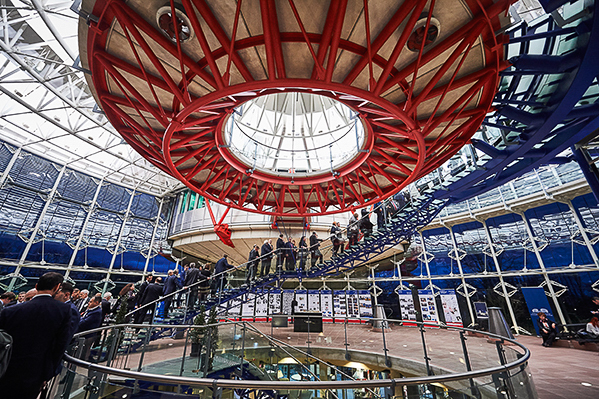Contact center of the Ukrainian Judiciary 044 207-35-46
ABOUT THE SUPREME COURT
FOR CITIZENS
ACTIVITY
PRESS-CENTER
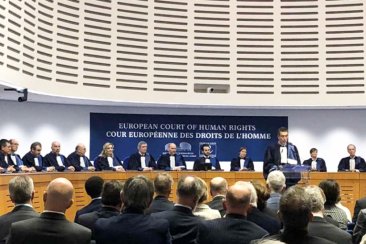
President of the Supreme Court Valentyna Danishevska and judge of the Grand Chamber of the Supreme Court Dmytro Hudyma participated in the celebration of Opening the New Judicial Year of the European Court of Human Rights, which traditionally takes place in Strasbourg (France) at the end of January.
On 31 January 2020 the solemn ceremony of Opening the Judicial Year had special significance, since this event was devoted to the 70th anniversary of the Convention for the Protection of Human Rights and Fundamental Freedoms (European Convention on Human Rights).
The SC President and judge of the SC GC visited the noted event at the invitation of the ECHR President Linos-Alexandre Sicilianos. In general, more than 250 guests were invited to Opening the Judicial Year, including presidents and judges of supreme and constitutional courts from member countries of the Council of Europe, as well as the CoE Secretary General Marija Pejčinović Burić, the President of the CoE Parliamentary Assembly Rik Daems, the President of the Venice Commission Gianni Buquicchio, and other highly respected guests.
On the occasion of Opening the Judicial Year, the seminar “The European Convention on Human Rights: living instrument at 70” took place. While this event the participants discussed topical issues facing the judiciary.
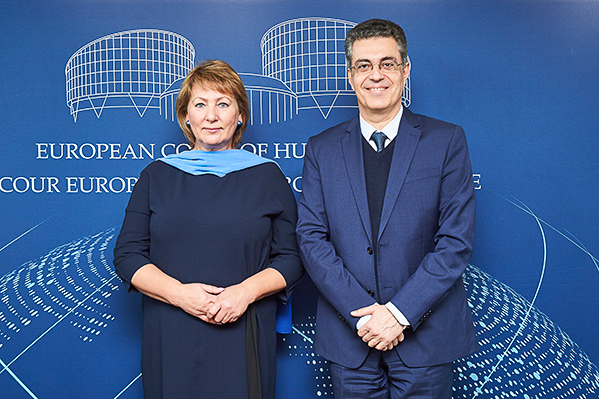
At this seminar following topics were discussed: “Living Instrument: The Evolutive Doctrine”, “Gender Equality”, “The Environment”, “Science and Technology”. Rick Lawson, Professor of European Law at the University of Leiden, presented his speech on the first topic. Particularly, in this part of the seminar its participants discussed the evolutive doctrine of the Convention and the application of the evolutive approaches by the ECHR; the development of the European Convention on Human Rights in the current context; the new challenges facing the ECHR while applying the Convention: the Court must remain moderate and restrained even in times of radical change, respond in a timely manner to the emergence of new categories of cases and the pressure on the rule of law.
It was also noted that the Protocol No. 16 to the Convention had become a landmark event in history of the ECHR, an important step in the sphere of human rights protection and their effective interpretation. Pursuant to this protocol, higher judicial institutions of the CoE member states, which have signed the Convention, may apply to the ECHR to receive advisory opinions on fundamental issues concerning the interpretation and application of rights and freedoms determined by the Convention and protocols to it.
Ineta Ziemele, President of the Constitutional Court of Latvia, highlighted the topic “Science and Technology”. Particularly, she remarked that scientific and technological achievements resulted in positive shifts in different countries, at the same time, these achievements could carry great risks. Given the development of science and technology, society faced many issues on human rights and freedoms. Due to the appearance of cyberspace, there was a problem related to the possibility of theft of personal data. Accordingly, new questions arose: how can this affect our self-determination as individuals, the concept of human dignity; whether we still own our inner space; how to ensure freedom of expression and respect for privacy in the Internet.
Other participants also presented their speeches: concerning gender equality – Juliane Kokott, Advocate General at the Court of Justice of the European Union; concerning environmental issues – Laurence Boisson de Chazournes, Professor at the University of Geneva.
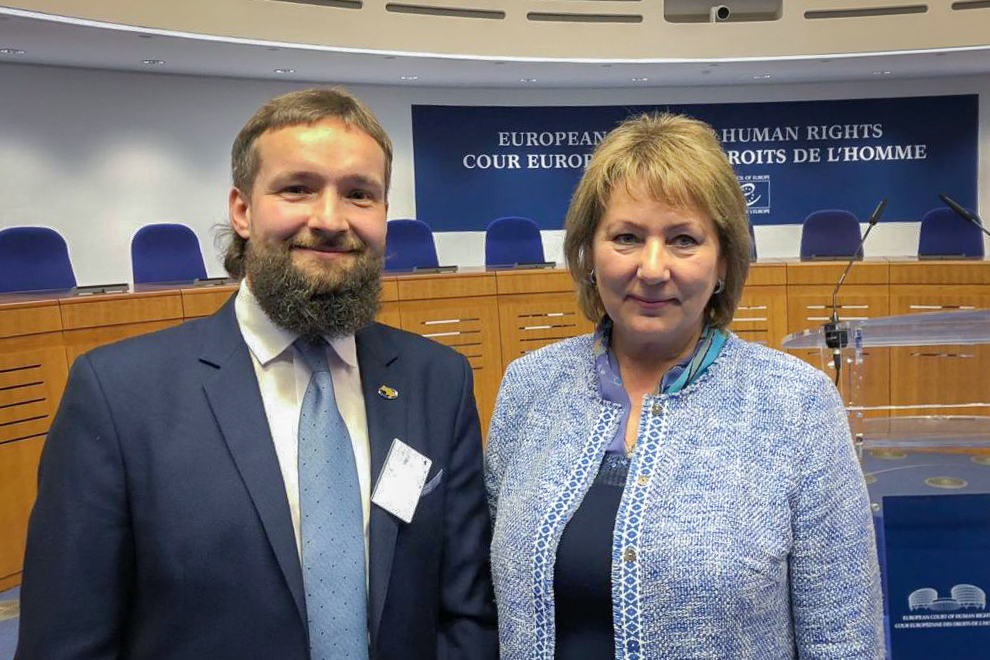
After the seminar, the solemn hearing of the ECHR occurred, while the opening of which the President of the ECHR Linos-Alexandre Sicilianos emphasized that for 60 years now the Court had been using its case-law to promote rule of law, democracy and human rights, the core values of the Council of Europe.
“This year, in 2020, we will celebrate the 70th anniversary of the Convention. The European Convention is no doubt one of the greatest peace projects in the history of humanity” – the President of the ECHR noted.
He underlined that the ECHR’s case-law was based on the idea that the rule of law underpins the entire Convention. The rule of law is not the rule of just any law. It is the rule of law based on the values of the Convention.
Linos-Alexandre Sicilianos determined three reasons for the universal success of the European mechanism for the protection of human rights. First of all, the Convention permeates all the branches of law: criminal and civil law, private and public law, not to mention such new areas as new technologies and environmental law.
The second reason for this success has a great deal to do with its evolutive interpretation. This evolutive interpretation method has allowed the text of the Convention to be adapted to “present-day conditions”, without any need for formal amendments to the treaty. “And most importantly, we have all of us, in our respective courts, ensured the permanence of the Convention, since it is still incredibly modern in 2020” – Linos-Alexandre Sicilianos emphasized.
The third reason for the Convention’s success over its seventy years of existence, in the ECHR President’s opinion, is the crafting of a specific European legal identity. “By interpreting the Convention, the Court has helped to harmonize European rules in the sphere of rights and freedoms. From its beginnings right up to the present, the Court has reinforced respect for human dignity by guaranteeing observance of such fundamental safeguards as: the right to life and the abolition of the death penalty; prohibition of ill-treatment; prohibition of slavery, servitude and human trafficking” – the speaker remarked.

In his opinion, the Court has introduced safeguards protecting individuals against arbitrariness, injustice and abuse of power. It has ensured the protection of the dignity of persons deprived of their liberty. And it has also built up comprehensive case-law to protect private and family life.
Linos-Alexandre Sicilianos also underlined that where political rights were concerned, the Court had endeavoured to protect pluralistic democracy by guaranteeing respect for the basic democratic principles in such areas as participation in free elections and freedom of expression, religion, assembly and association.
“It is essential here to remember that democracy is the only political model envisaged by the European Convention of Human Rights and the only system compatible with it. No other international body has established in such a crystal-clear manner this link between democracy and human rights. That is why the Court remains particularly vigilant when the foundations of democracy are imperilled, including any attempt at undermining the independence of judges” – President of the ECHR emphasized.
He reminded that sixty years ago the first judgment delivered by the European Court of Human Rights, under the presidency of the illustrious René Cassin, had been Lawless against Ireland; the Court’s early case-law included several leading Irish judgments. Taking into account this fact, the President of the ECHR gave the floor for the President of the Supreme Court of Ireland Frank Clarke, who more than thirty years ago was one of the lawyers in the famous Open Door and Dublin Well Woman case.
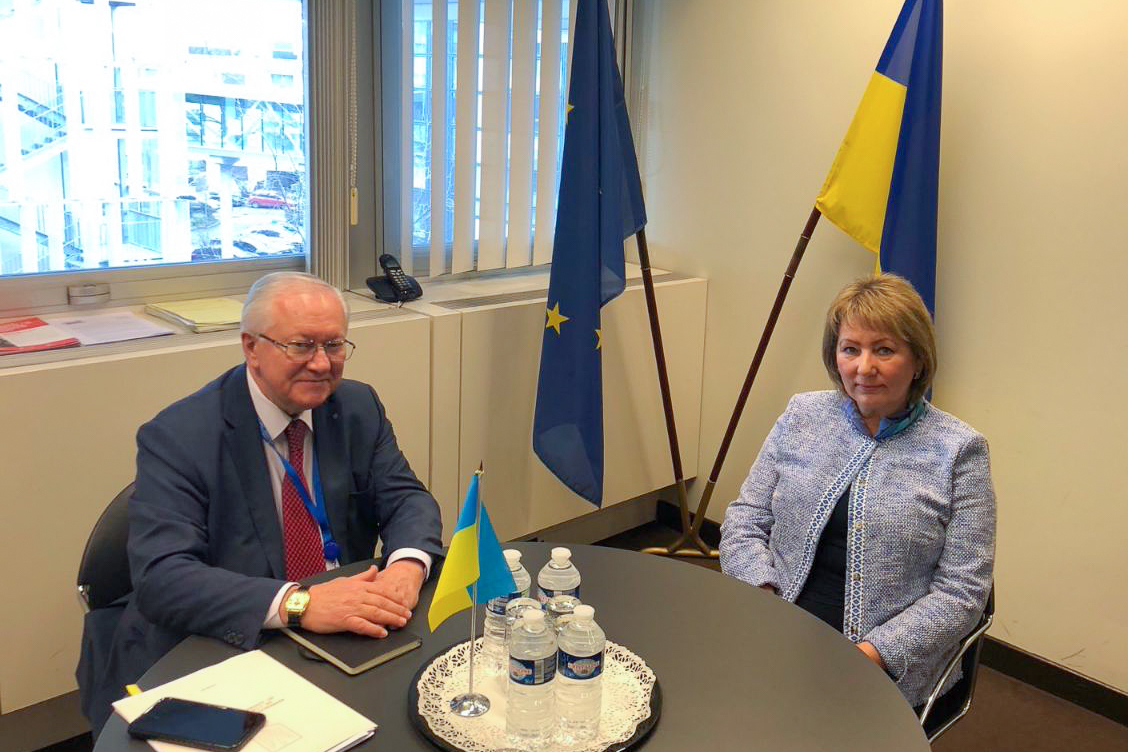
While her visit to Strasbourg Valentyna Danishevska also had a short protocolary meeting with Borys Tarasiuk, the Permanent Representative of Ukraine to the Council of Europe.
Lina Hubar, the Head of the Division for International and Legal Cooperation, was also the member of the SC delegation.
The Supreme Court expresses thanks to the Department of Justice and Legal Cooperation of the Council of Europe and the CoE Project “Support to the Implementation of Judicial Reform in Ukraine” for their assistance in carrying out this visit.
Follow the link, to read the unofficial translation of the speech of the President of the European Court of Human Rights Linos-Alexandre Sicilianos.
Some photographs were taken from the official web-site of the European Court of Human Rights.
